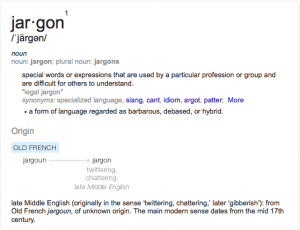Generally speaking, don’t use jargon.
If you happen to be in an audience of your peers, then, sure. Jargon away. Without a doubt, though, friendly terms that the broadest audience can understand transmits an energy of esteem, of confidence that we understand what we are talking about. It puts our audience at ease and sets them up to get the most out of any teachable moments. Jargon in the wrong crowd only creates alienation, frustration and miscommunication.
I agree with Peter Gabriel’s perspective on jargon. He wrote a song about it:
The place where I come from is a small town
They think so small
They use small words
But not me
I’m smarter than that
I worked it out
I’ve been stretching my mouth
To let those big words come right out
When I hear someone using jargon I’m not able to help but get the feeling they are over-compensating for something. If we understand something well, we should be able to explain it as easily to a 5-year-old as we do to a 55-year-old. I’ll be honest with you: your clients hate it when you use jargon. It doesn’t make them feel as cool as it might make you feel.
There is a lot of jargon out there. Technology, by itself, is another language, full of complexities. It has its own nuances, postures, protocols and fashions consistent with any other cultural anthropology. Couple the jargon of technology with the cultures of advertising, sales and marketing and what we get is an utter flurry of buzzwords and motivational phrases, much of it used without any concrete understanding of what it actually means or any consideration for those (ie average bears) who for sure have no idea what any of it means.
It’s easy to take communication for granted, as if it is a very simple task to understand each other day-to-day, much less in the context of sharing big, complex ideas. Truth is, effective communication is an art form. It is only done with intention and thoughtfulness. It’s easier to miscommunicate than it is to communicate effectively. We should be grateful for our most powerful asset, humbled and reassured, time and time again, that we have imagination and the ability to make ourselves understood.
We all have our own strategies for attempting to transmit complex concepts to broad audiences of all ability levels. In me, it comes off much of the time as silliness. That’s the way I process information and turn it into my own ideas. It helps in making things simpler, reducing the complex to friendly terms that I can understand. That my friends and family can understand.
 Jargon itself can be silly by virtue of the fact that it actually says nothing, nothing that makes sense, anyway. For example, the most gifted mentors I have had have one thing in common: they avoid jargon altogether. Speaking clearly and simply demonstrates that we understand the concept being discussed.
Jargon itself can be silly by virtue of the fact that it actually says nothing, nothing that makes sense, anyway. For example, the most gifted mentors I have had have one thing in common: they avoid jargon altogether. Speaking clearly and simply demonstrates that we understand the concept being discussed.
I have trained myself to ask this question over and over:
Can I describe it in simple terms that everyone can understand? If not, I may not understand it as well as I think I do and may need to do more research.
Are you dealing with someone who uses too much jargon? Try translating back to them what you think they said to help verify that you understood. Ask them kindly to speak in simple terms or ask them if there are any good analogies or metaphors that can be drawn in order to make a complicated thing more friendly to understand.
It is up to each of us to break through the calcification jargon often imposes on communication in our business culture, in particular. Otherwise, we are doomed to continue being frustrated by it.
